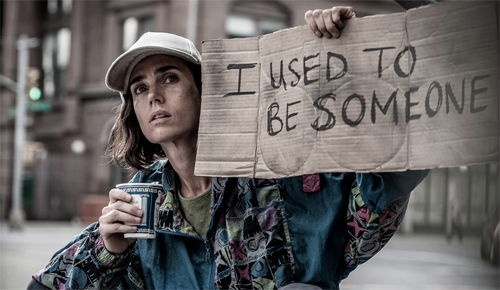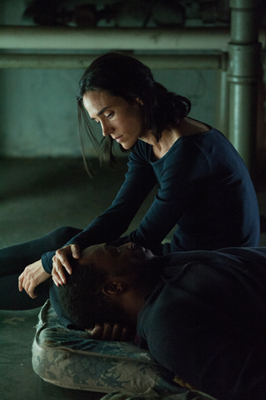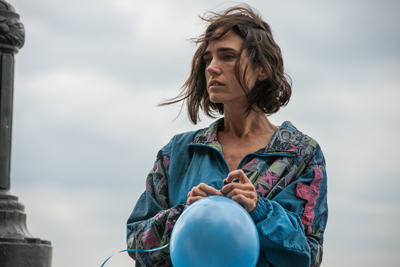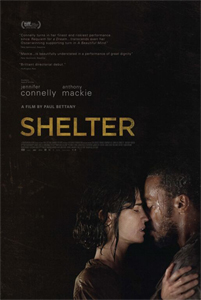
Paul Bettany may be known as one of our finest English actors, with roles in such major films as A Beautiful Mind, Master and Commander, The Da Vinci Code and of course, Marvel’s Avengers franchise. What he also is however is now a fifteen year resident of New York City with Oscar-winning wife (and Beautiful Mind co-star) Jennifer Connelly. The city, which Bettany loves, is currently facing a homeless crisis which sees 60,000 people seeking public shelters nightly. The majority of them families.
The actor had been developing a story about judgment and redemption for his feature directorial debut, but it wasn’t until Hurricane Sandy hit his home city that Bettany honed in on filtering his story through the lens of the homeless experience. The result was Shelter, which Bettany describes as a “moving optimistic story,” and stars Connelly as Hannah and Anthony Mackie (Captain America: Civil War) as Tahir, a pair of homeless people from completely different worlds now residing in New York City. They come together to help each other face their pasts and the everyday trials of living on the streets. An impassioned, opinionated Bettany joined Connelly and Mackie this week at the New York press conference for the film.
One particular homeless couple focused Bettany on where his story would go:
Paul Bettany: “I live in a really nice apartment I moan about because I’m now a New Yorker…outside this apartment was this homeless couple. A black man and a white woman, she was blonde. And I would see them, we would see them, we would pass them on the school run. My children would say hello to them, they’d say hello to us, and that was kind of the extent of it. And I have to, I’m ashamed to say, that day by day, their poverty became more and more acceptable to me and they became invisible. Before they actually disappeared. And then Hurricane Sandy hit and we never saw them again. There was a mandatory evacuation of our area of Tribeca and they used to live in a tiny little piece of like a ‘park’–it’s laughable, it’s smaller than this room–on the corner of Canal Street and the West Side Highway. And they used to live under a plastic tarpaulin and I noticed that they seemed to complain a lot less about their circumstances than I did and I admired that. And then I really couldn’t see them anymore and I felt the instinct to write about them. But I didn’t know who they were. And then I thought, well wait a second, maybe that would be a really good way to discuss judgment because I find our response to homelessness really puzzling. It’s a peculiar response that people have.”
This “peculiar response” was loudly voiced this week by New York’s own Police Commissioner Bill Bratton who had advised city dwellers to ignore panhandlers and not spare them any change in order to get them off the streets. At the press conference Bettany, who spent three years developing the script for Shelter and by extension working with and researching organizations that support the homeless, was asked to address this idea, firing back:
Bettany: “I’m not one to say anything rude about anyone else but, that’s a fucking stupid idea. To ignore a homeless…The homeless. Especially when there’s 60,000 of them on the streets—staying in shelters—in a city that’s home to more billionaires than any city on Earth, you know…I can’t believe that someone would say ‘ignore homeless people.’ And frankly, it’s absolutely the reason I feel it’s urgent. Obviously I spent three years bleeding it into a movie that’s trying to talk about exactly that. So forgive me if I get a little bit heated about it. Because that sort of mentality just drives me up the wall.
They’ve been ignored for too long. I’ll just tell you this, if you are a family on the brink of eviction, you’re 80% less likely to be evicted If you have legal counsel. But there is no right to legal counsel in a housing court. It would cost the city $12,500 to grant that family legal counsel. The average stay in a shelter for a homeless family once they have been evicted costs the city $45,000. So not only does it seem to be morally the right thing to do, it also just seems fiscally a smart thing to do, right? You’re thinking outside the box…
All of these figures that I have my head you know because I’ve been really thinking about this for a long while, I say them in front of audiences and I can just—I know that they’re mind blowing and then kind of numbing and that’s the interesting thing about narrative. Narrative can breath life into those figures that can be baffling. And peculiarly they become more meaningful the smaller they get. Which is why Shelter is just about two people. And two people who need forgiveness and who are deserving of forgiveness. Cause you know what? It’s not just those 24,000 children [staying in shelters] because when I say it, I always I feel the audience go ‘[gasps] Not children!‘ but actually we’re all innocents. We’re all worthy of forgiveness. And we’re all fundamentally deserving of a home”
For Connelly and Mackie, working on Shelter refocused their perspectives on the struggles people face.
Jennifer Connelly: “There’s no group of people that isn’t entitled to the same basic human rights as the rest of us…It reminded me how much I need to strive to remain aware and to keep seeing those people. And to keep seeing what’s happening around the world. And to keep you know, to be conscious of how blessed we are to worry about the silly things that we worry about most of the time. When people are worrying about where they’re going to sleep and how they’re going to feed their kids and will they make it through the day. Important to think about.”
Anthony Mackie: “The level of judgment and the lack of humanity I saw in myself was disgusting. Every time I would walk past a homeless person I’d be like ‘Get up, get a job! Get off drugs!’ I never took into account what that person had been through or what happened to get that person to that place. And it just really blew my mind, you know, learning what I learned about homeless shelters and just the idea of finding a warm place to sleep at night, it reminded me of the prison system. And the idea or the lack thereof of rehabilitation in the prison system. You know just trying to get a good night sleep within incarceration… And it was just troubling and eye opening. And I never really took into account the number of families.
my mind, you know, learning what I learned about homeless shelters and just the idea of finding a warm place to sleep at night, it reminded me of the prison system. And the idea or the lack thereof of rehabilitation in the prison system. You know just trying to get a good night sleep within incarceration… And it was just troubling and eye opening. And I never really took into account the number of families.
You know when I was a kid we used to do this feeding the hungry at my church every other Saturday and it blew my mind one day when I was you know, like scooping out food and this kid from my school was there. I was like ‘Holy sh—shibbity jibbit! That dude we go to school together!’ And somewhere between that moment of realization and appreciation for what my dad sacrificed for us to have and me becoming ‘Anthony Mackie’ I lost it. And this movie really made me realize. And it was very humbling and very sickening to see that within yourself. And so now I make my kids go and scoop chicken on the weekends. And if they don’t do the right thing, I take their shit from them and give it to other kids. [laughs]”
Connelly immersed herself in organizations that reached out to those struggling:
Connelly: “Coalition for the Homeless, that group of people were really helpful to me. I spent time with them, talking to them and visiting shelters and going out on their food runs. Which, every night they deliver meals and stop at set points around the city and people rely on those meals so you can meet people coming in. And I heard a lot–I met and watched and learned from a lot of people. There’s a place called the Lower East Side Harm Reduction Center, which started out just as a needle exchange program, and it still is and also has health support services and outreach programs, and overdose prevention and a number of other programs. I spent a lot time there at their location, and going on their walkabout talking to people. Yeah, people were very generous with their stories and with their time. So I was really listening to people, watching people and hearing their stories.”
As for the actual making of the film, Bettany made the considerable leap from acting to directing. I asked him if he’d turned to any of the impressive directors he’s worked with in the past (a list including Joss Whedon, Ron Howard and Peter Weir) for advice when he began this project.
Bettany: “No. No I didn’t but they were the biggest resource for me in showing them early cuts of the movie. Ron Howard, Darren Aronofsky, lots of people that I know–David Koepp, and not just directors, Joss Whedon, Johnny Depp…Just loads of people that I’ve worked with and trust and really whose–who I really admire. But I did that afterward.
You know, I really kept my eyes open as an actor, I’m really interested. You know I see it, you see it when you meet a young actor first day on set, you can see whether they’re gonna be the sort of actor who’s gonna bullshit that they know what they’re  doing [laughs] or asked loads of questions. And I was really inquisitive and I wanted to know ‘hey, what’s that do?‘…I was that sort of an actor when I was them at that age. And so I’ve been watching and one of the things that I’ve really noticed with the great directors and actually I first saw this, recognized in Peter Weir, is he knows who’s telling the story. Whether it is the actors holding the responsibility or whether it’s the camera crew holding the responsibility. And if it’s the actor holding the responsibility, every take is the actor’s. And by that I mean there is no complicated techni-crane move that’s going to move in on you during your speech and come in and catch a tear rolling down your cheek and eight out of ten of them are out of focus. ‘Cause all of those takes are for the crew, because there’s this complicated camera. Every scene that is held by the actors is just simple simple camera work. Nothing can be out of focus, every take can be going to you the actor. Just generous, every take. Every take. And then when it’s the camera crew, you better be on your fucking mark. Because they’re the ones telling the story, right, they’re the ones responsible for it. So I thought about that a lot and tried to figure out who was the most important. (It was me. [laughs])”
doing [laughs] or asked loads of questions. And I was really inquisitive and I wanted to know ‘hey, what’s that do?‘…I was that sort of an actor when I was them at that age. And so I’ve been watching and one of the things that I’ve really noticed with the great directors and actually I first saw this, recognized in Peter Weir, is he knows who’s telling the story. Whether it is the actors holding the responsibility or whether it’s the camera crew holding the responsibility. And if it’s the actor holding the responsibility, every take is the actor’s. And by that I mean there is no complicated techni-crane move that’s going to move in on you during your speech and come in and catch a tear rolling down your cheek and eight out of ten of them are out of focus. ‘Cause all of those takes are for the crew, because there’s this complicated camera. Every scene that is held by the actors is just simple simple camera work. Nothing can be out of focus, every take can be going to you the actor. Just generous, every take. Every take. And then when it’s the camera crew, you better be on your fucking mark. Because they’re the ones telling the story, right, they’re the ones responsible for it. So I thought about that a lot and tried to figure out who was the most important. (It was me. [laughs])”
Connelly was asked if she’d like to turn the tables and direct Bettany eventually, but it seems unlikely:
Bettany: “Do you want to direct me? I can’t imagine anything worse, I’m very difficult.”
Connelly: “I have no eminent plans to direct anything although I’d imagine it’d be something that I’d find–it intrigues me but I’m not nearly ready to, I don’t think–”
Bettany: “I’d be terrified!”
Shelter opens in limited release and on VOD November 13th

